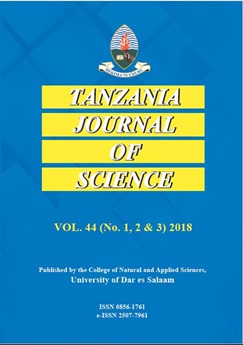Antimicrobial Activities of Endophytic Fungi Secondary Metabolites from Moringa oleifera (Lam)
Abstract
This study presents the antimicrobial activities of secondary metabolites of endophytic fungi isolated from a medicinal plant Moringa oleifera growing at the University of Dar es Salaam, Tanzania. Two endophytic fungi were identified, Nigrospora sp. from leaves, and Fusarium sp. from roots and seeds. The disc method was used in testing the antimicrobial activities of the crude extracts of endophytic fungi secondary metabolites against four human pathogens, namely, Bacillus substilis, Staphylococcus aureus, Escherichia coli, and Candida albicans. The results revealed that the crude extracts of endophytes secondary metabolites from leaves showed strong antimicrobial activities against two Gram positive bacteria and fungi with Minimum Inhibitory Concentrations (MICs) ranging from 0.016 mg/mL to 0.5 mg/mL, while from roots and seeds showed moderate antimicrobial activities with MIC ranging from 0.6 mg/mL to 1 mg/mL. Qualitative phytochemical analysis of the same extracts also revealed the presence of vital constituents potential for medicinal applications such as alkaloids, phenols, flavonoids, tannins, terpenoids, and saponins. This study demonstrated that secondary metabolites of endophytic fungi from Moringa oleifera possess important phytochemical and exhibit antimicrobial potential against the tested human pathogens which could contribute to the endeavours for new therapeutic inventions.
Keywords: Antimicrobial activity; Endophytic fungi; Medicinal plants; Moringa oleifera


